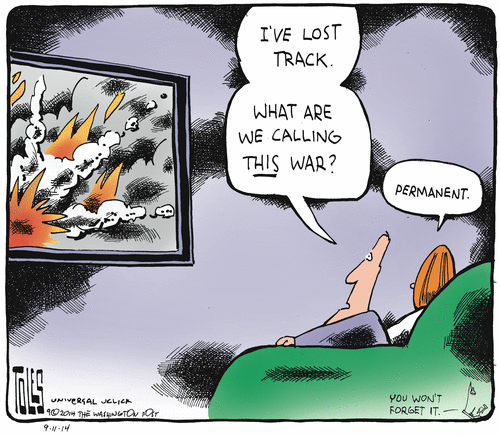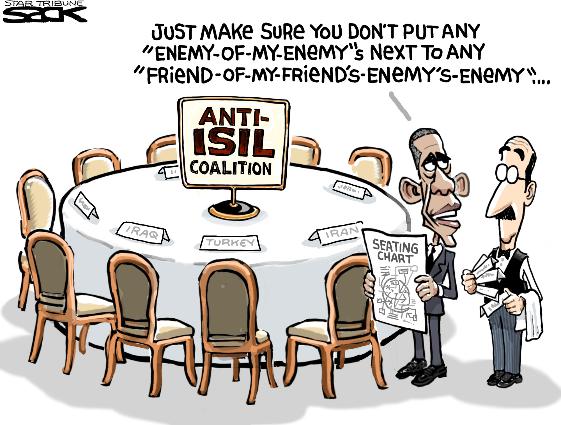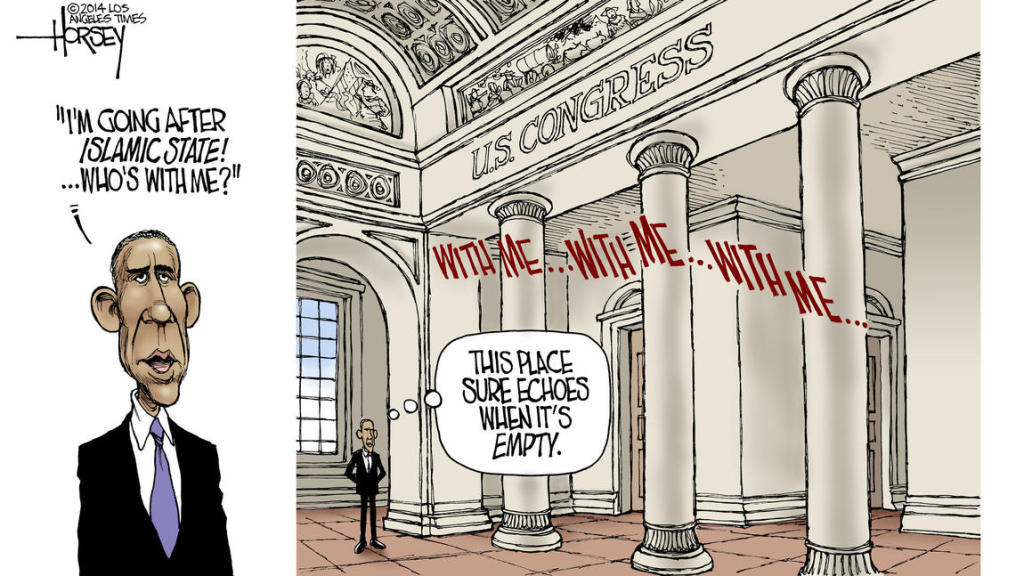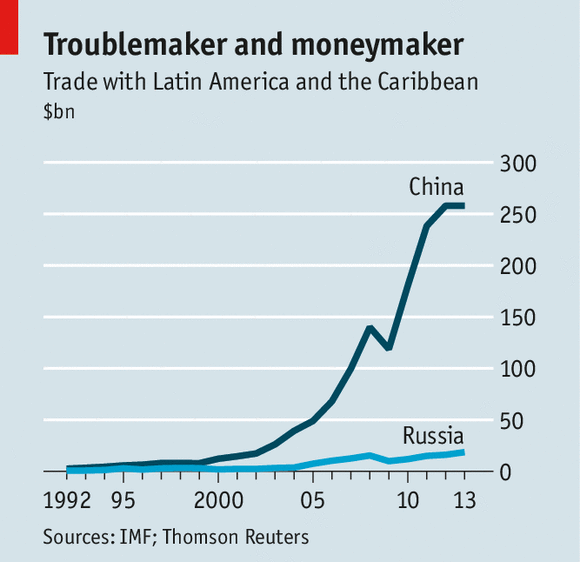What’s Wrong Today:
Here is some perspective from two former presidents on the possibility of our returning to war. First, from Gerald Ford, speaking about Vietnam, at Tulane University in April, 1975: (h/t to Rachel Maddow writing today in the WaPo)
We, of course, are saddened indeed by the events in Indochina…Some tend to feel that if we do not succeed in everything everywhere, then we have succeeded in nothing anywhere. I reject categorically such polarized thinking. We can and we should help others to help themselves. But the fate of responsible men and women everywhere, in the final decision, rests in their own hands, not in ours
And the money quote is from Thomas Jefferson:
We have the wolf by the ears and feel the danger of either holding or letting him loose
So it is with Mr. Obama and the Middle East. He has the wolf by the ears. Some of our erstwhile allies on the Arabian Peninsula are encouraging a radical Sunni uprising in Iraq, and in Syria. It’s part of a regional, sectarian war, and we should have no interest in furthering the violence on either side. Bush’s team empowered Iran with the destabilization of Iraq. Then, Mr. Obama’s decision in Syria helped push our Sunni allies (Saudi Arabia, and Turkey) to go all-in with AL-Qaeda types in Syria. Let’s take another look at a map of the Sunni-Shia divide that we posted about a year ago:

Since the 1930’s when we first recognized Saudi Arabia, we have tried to straddle the fence with our choice of allies in the Middle East. Turkey (NATO member) is Sunni. So is Saudi Arabia. Our enemy AL-Qaeda is Sunni. Our “enemy” Iran is Shia. Our “ally” Iraq is Shia. So what did we think would happen when we deposed Sadaam’s minority Sunni government and replaced it with a majority Shia government in Iraq?
Since Assad has fought ISIS (Sunni) to a standstill, they have now moved part of their operations into Iraq to further inflame the regional situation, so that the US will be required to intervene, something that Saudi Arabia and the other Gulf Oil States and neo-con supporters of Israel have been advocating for some time.
Today, we have no real allies among the Muslim states in the Middle East. So, do we stay on the sidelines or do we go in with both feet? Mr. Obama, on Face the Nation:
But I think it’s important for us to recognize that ISIS is just one of a number of organizations that we have to stay focused on. Al Qaeda in Yemen is still very active and we’re staying focused on that. In North Africa, you’re seeing organizations, including Boko Haram that kidnapped all those young women that is extreme and violent
That doesn’t sound like in with both feet. Mr. Obama went on to say:
What we can’t do is think that we’re just going to play Whack-A-Mole and send US troops occupying various countries wherever these organizations pop up
Yet, neo-cons think that ISIS is a perfect tool for two American goals. First, they think ISIS helps in the removal of Iraqi Prime Minister Maliki, something which would make Israel very happy, since it would weaken Iraq’s connection to Iran.
Second, ISIS could be an excuse for American air attacks. If ISIS could be forced back into Syria by American jets, it could create an opportunity for Assad to continue to do the dirty work for both America and Iraq.
Andrew Bacevich, in an interview with Bill Moyers, took down the neo-cons, particularly Dick Cheney and Robert Kagan:
There is very little effort to look beyond the Bush versus Obama, Republican versus Democrat, to try to understand the larger forces in play that have brought us to where we are today…to think somewhat more creatively about policy than simply having an argument about whether we should, you know, attack with drones or attack with manned aircraft
Bacevich calls out the neo-cons, specifically, Kagan: (brackets by the Wrongologist)
He [Kagan] believes, many people in Washington believe, perhaps too many people in the hinterland also believe, that the United States shapes the global order. That there is an order for which we alone are responsible
He goes on to say we look for easy solutions: (emphasis by the Wrongologist)
You know, we live in a country where if you want to go bomb somebody, there’s remarkably little discussion about how much it might cost, even though the costs almost inevitably end up being orders of magnitude larger than anybody projected at the outcome. But when you have a discussion about whether or not we can assist people who are suffering, then suddenly we come very, you know, cost-conscious…
We have been engaged in the Muslim world at least since 1930’s, based largely on the assumption that projecting American military power could somehow “fix” this part of the world, or at least secure our access to its oil resources.
So, we now have a track record to review. We intervened militarily in Lebanon in 1982. In Somalia. In Iraq, Afghanistan and Libya. And Yemen.
Has the region become more or less stable? Has it become more democratic? Is there less anti-Americanism? The answer to all of the above is no. So, it is time to recognize that US military intervention in the Middle East has failed as a primary means of US policy.
Despite all the testosterone running rampant in Washington, we are not going to meet our goals by simply bombing more Muslims.
The events unfolding in Iraq right now require a debate around the question, “what should we do about Iraq?” The nation-state of Iraq was never a particularly good idea, but it plodded along for most of the 20th-Century with a series of kings and dictators at the helm. President George W. Bush ended that Iraq, and it is very doubtful that it can be saved.
Neither Iran nor the US has an interest in a protracted civil war in Iraq. And both the US and Iran have an interest in greater stability in this region. More from Bacevich: (emphasis by the Wrongologist)
We should at least explore the possibility, whether this common interest in stability can produce some sort of an agreement comparable to Nixon’s opening to China. When Nixon went to China, that didn’t make China our ally. It didn’t have the immediate effect of bringing about a political change in China. But it did change the strategic balance in ways that were favorable to us and frankly favorable to the rest of the world
All efforts should be focused on creating a negotiated settlement and new boundaries rather than preserving Syria and Iraq as coherent nation-states. It is unlikely that they will ever be coherent nation-states again.
We need a new approach to our participation in the Sunni-Shia divide, one that keeps America from intervening again. Shortly after Mr. Obama was inaugurated, he went to Cairo and gave a speech that proposed a new beginning in the Middle East, a new beginning of US relations with the Islamic world.
Whatever happened to that President Obama?

















